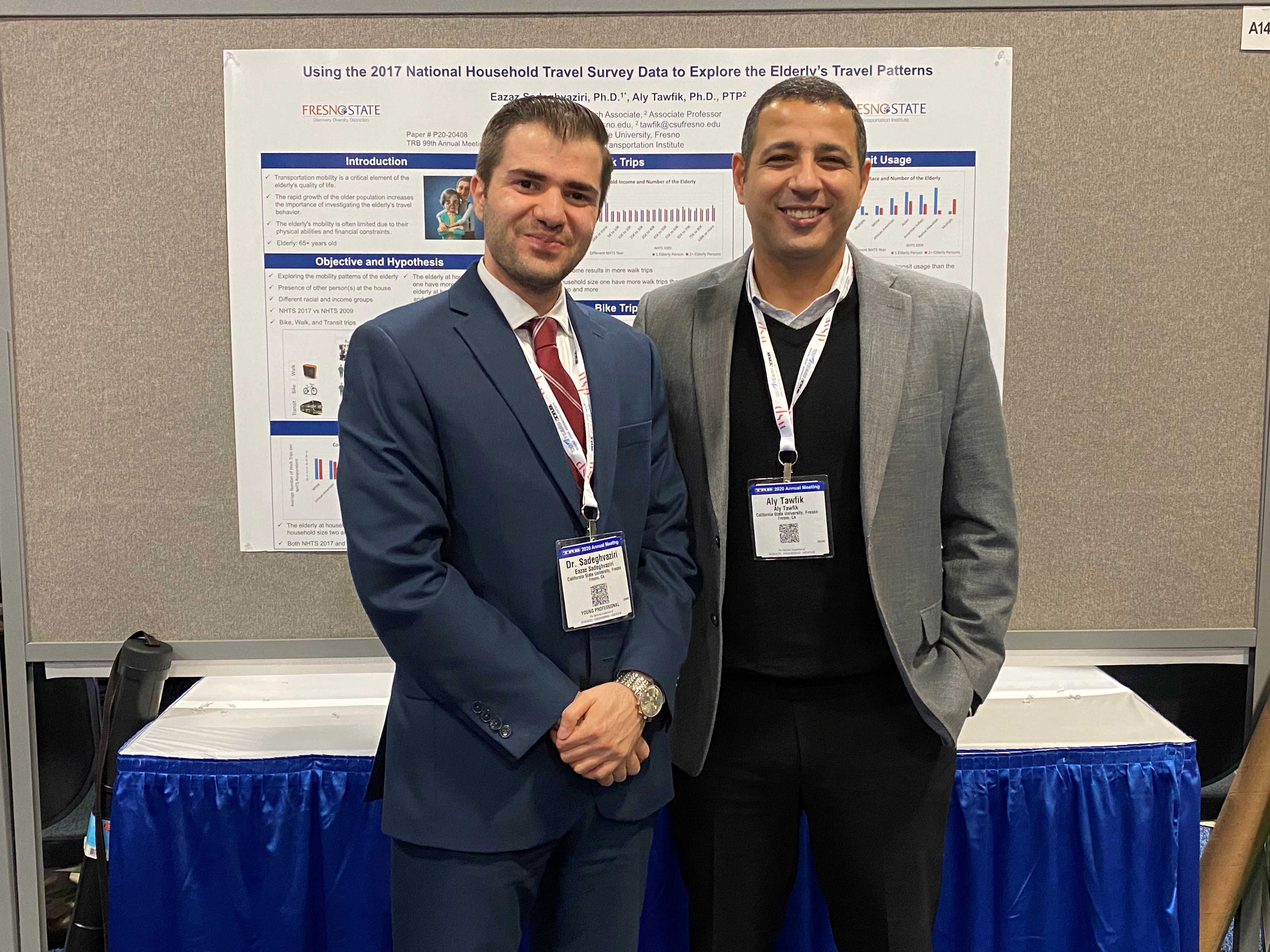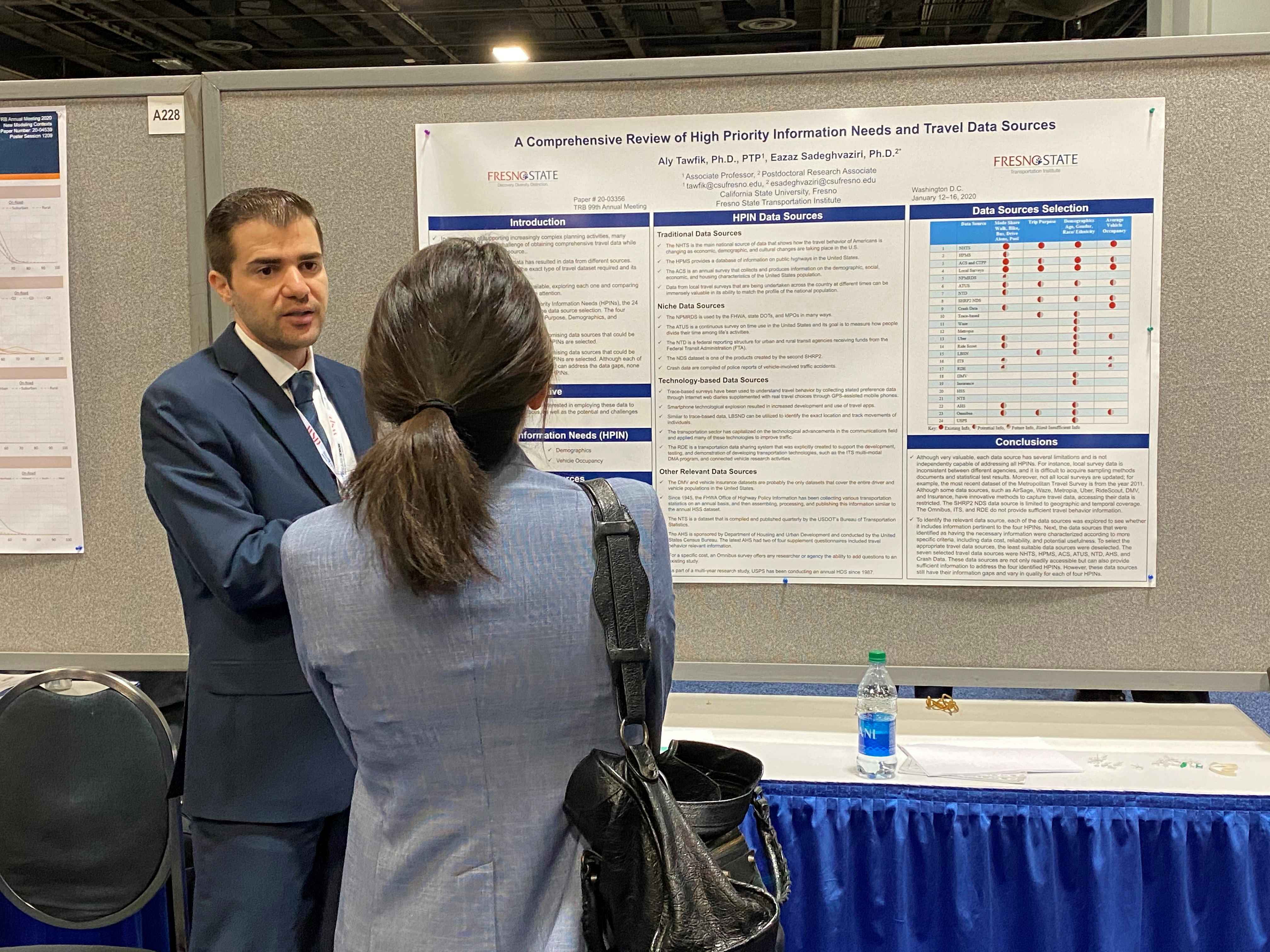Fresno State Transportation Institute
Presentations
Conference Presentations
Dr. Christian Wandeler is going to present a presentation at the “International Conference on Informatics in School: Situation, Evaluation, Problems (ISSEP);” at Tallinn University, Estonia, on 11/17/2020. Dr. Wandeler’s project, “The Fresno State Transportation Challenge,” was founded through FSTI CSUTC Innovative Projects. View Dr. Wandeler’s final report.
Dr. Mazen Eldeeb will present his presentation, “Chemical Kinetic Model Reduction and Analysis of Tetrahydrofuran Combustion using Stochastic Species Elimination,” at the ASME 2020 Power Conference on 08/4/2020 in Anaheim, California. His project, “Development of reduced chemical kinetic models for the numerical simulation of combustion and emissions behavior of representative conventional and bio-derived transportation fuels,” was founded through FSTI CSUTC Grant Projects. View Dr. Mazen Eldeeb's final report.
Dr. Shahab Tayeb and his students, Robert Wong and Sumanjit Gill, presented their presentation, “A Data-Centric Approach to Taming the Message Dissemination in the Internet of Vehicles,” at the 34th Annual CSU Student Research Competition on 04/24/2020. His project, "Securing the Emerging Autonomous and Connected Vehicles for Greater Community Livability," was founded through FSTI CSUTC Innovation Projects. View Dr. Shahab Tayeb's final report.
Dr. Shahab Tayeb gave a lecture about “Securing the Internet of Vehicles,” at DMV HQ AV Branch (Sacramento, CA), on 01/24/2020. His project, "Securing the Emerging Autonomous and Connected Vehicles for Greater Community Livability," was founded through FSTI CSUTC Innovation Projects. View Dr. Shahab Tayeb's "Securing the Internet of Vehicles" final report.
Conference: The 2020 Transportation Research Board (TRB), the 99th Annual Meeting, January 12-16, 2020 at Washington DC.

Abstract:
Transportation mobility is a critical element of the elderly’s quality of life. The rapid growth of the older population increases the importance of investigating the elderly’s travel behavior. The elderly's mobility is often limited due to their physical abilities and financial constraints. By using data from the 2017 National Household Travel Survey (NHTS), the goal of this study was to explore the mobility patterns of the American elderly. The elderly’s number of trips is studied among different racial groups and different incomes. The number of trips has been compared for the walk, bike, and transit trips. It was hypothesized that the number of trips of elderlies decreases by the presence of other person(s) at the house. In other words, if an elderly person lives in a house where the household size is more than one he/she has fewer trips than if he/she lives in a house where the household size is one. It was also hypothesized that the number of trips of the elderly is affected by their race. Moreover, since income plays an important role in individuals’ travel behavior, the effect of income has been investigated for the elderly. It was hypothesized that more amount of income, results in more number of trips. Hence, it is recommended to increase the public transportation quality where there is a huge elderly population who have low income. All analysis has been done using both NHTS 2017 and NHTS 2009 dataset, and the results have been compared. This study’s findings are valuable for the transportation planner by providing additional information about the elderly’s travel patterns.
Conference: The 2020 Transportation Research Board (TRB), the 99th Annual Meeting, January 12-16, 2020 at Washington DC.

Abstract:
In the process of supporting increasingly complex planning activities, many agencies are facing the challenge of obtaining comprehensive travel data while working with only one data source. High demand for more travel data has resulted in data from different sources. However, it is essential to know the exact type of travel dataset required and its data sources. Although various data sources are available, exploring each one and comparing them with each other has received little attention. This review focuses on the four High Priority Information Needs (HPINs), the 24 travel data sources, and the process of the data source selection. The four investigated HPINs are Mode Share, Trip Purpose, Demographics, and Vehicle Occupancy. Among all available data sources, seven promising data sources that could be suitable for addressing the identified set of HPINs are selected. The selected data sources are NHTS, HPMS, ACS, ATUS, NTD, AHS, and Crash Data. Although each of the data sources has valuable information and can address the data gaps, none are independently capable of addressing all HPINs. The goal of this review is to help people interested in employing these data to understand better the current practices, as well as the potential and challenges associated with the data sources.
Dr. Chih-Hao Wang presented his presentation, “Does Accessibility via Green Transportation Modes Matter for Transportation Equity? An Investigation for Two Medium-size U.S. Cities,” at the 99th Annual Transportation Research Board Conference, in Washington D.C. on 01/14/2020. His project, “Developing a Fair Accessibility Framework Through Green (Non-Auto) Transportation Modes For Fresno, California,” was founded through FSTI CSUTC Research Projects. View Dr. Chih-Hao Wang's final report.
Dr. Hongwei Dong presented his presentation, “The Geographic Disparities in Transportation-Related Physical Activity in the United States: An Analysis of 2017 NHTS Data,” at the 99th Annual Transportation Research Board Conference, in Washington D.C. on 01/14/2020. His project, “The Geographic Disparities in Transportation-Related Physical Activity In the United States: An Analysis of the 2017 NHTS Data,” was founded through FSTI CSUTC Research Projects. View Dr. Hongwei Dong's final report.
Dr. Shahab Tayeb presented his presentation, “A Data-Centric Approach to Taming the Message Dissemination in the Internet of Vehicles,” at IEEE 10th Annual Computing and Communication Workshop and Conference (CCWC), Las Vegas, NV, on 01/07/2020. His project, "Securing the Emerging Autonomous and Connected Vehicles for Greater Community Livability," was founded through FSTI CSUTC Innovation Projects. View Dr. Shahab Tayeb's "A Data-Centric Approach to Taming the Message Dissemination in the Internet of Vehicles" final report.
Dr. Shahab Tayeb presented his presentation, “Securing the Internet of Vehicles,” at ENGR 200, on 10/30/2019. His project, "Securing the Emerging Autonomous and Connected Vehicles for Greater Community Livability," was founded through FSTI CSUTC Innovation Projects. To see the final report, please click View Dr. Shahab Tayeb's "Securing the Internet of Vehicles" final report.
Dr. Fariborz Tehrani presented his presentation, “Green Strategies for Design and Construction of Non-auto Transportation Infrastructure,” at the 2019 Engineering Mechanics Institute (EMI) Conference, in Los Angeles, CA, on 06/19/2019. His project, “Green Strategies for Design and Construction of Non-Auto Transportation Infrastructure,” was founded through FSTI CSUTC Research Projects. View Dr. Fariborz Tehrani's final report.
Dr. Maryam Nazari’s student, Mr. Faiaz Rahman, presented his presentation, “Lightweight Rubberized Concrete Pavement Slabs Using Tire-Derived and Expanded Clay Aggregates – Life Cycle Cost Analysis,” at the 40th Annual Central California Research Symposium (CCRS), in Fresno, CA, on 05/08/2019. Dr. Nazari’s project, “Green Strategies for Design and Construction of Non-Auto Transportation Infrastructure,” was founded through FSTI CSUTC Research Projects. View Mr. Faiaz Rahman's final report.
PI Presentations